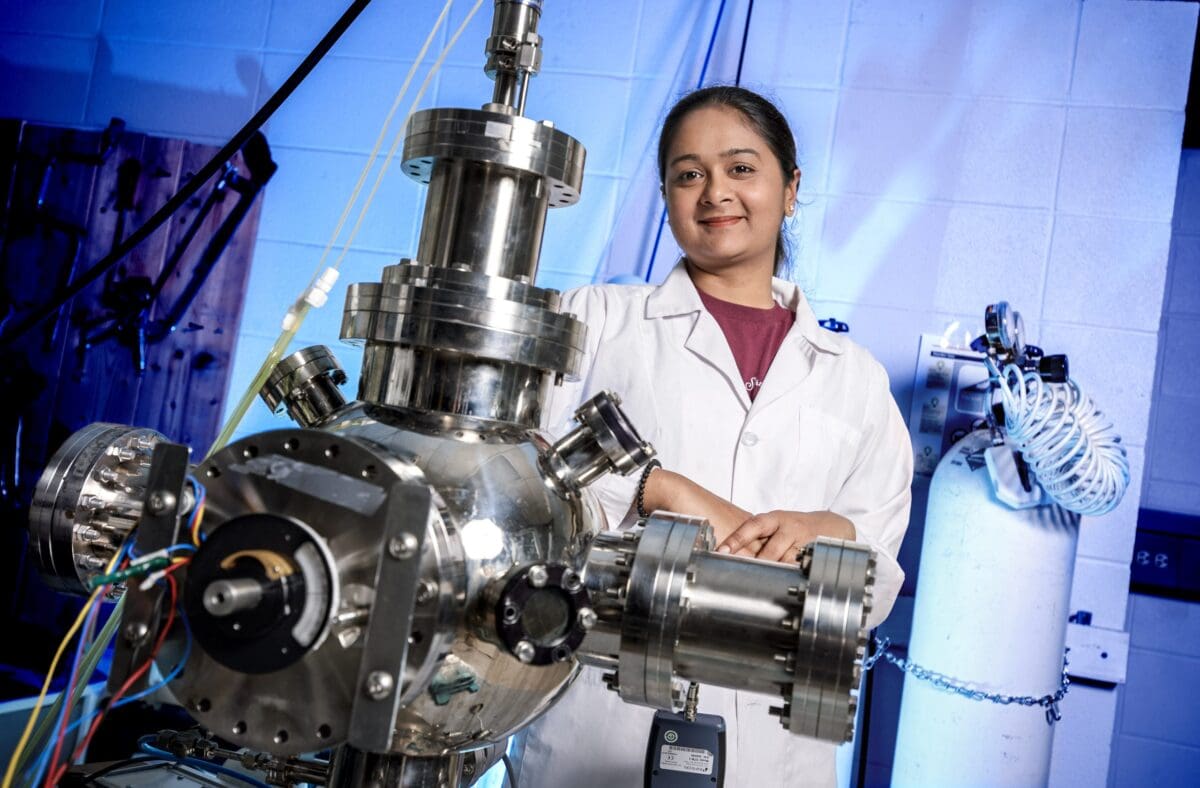UA Little Rock Student Wins National Materials Science Award from AVS

A University of Arkansas at Little Rock doctoral student has won a prestigious national graduate student award from the AVS for her materials science research into creating a more efficient method of water purification.
Ranjitha Hariharalakshmanan, who is earning a Ph.D. in applied physics, has been named the 2023 winner of the Dorothy M. and Earl S. Hoffman Award from the AVS, an organization that promotes research in surface, interface, vacuum, and thin film science and technology.
Hariharalakshmanan will receive a $1,500 award, a certificate, and a travel award to attend the AVS 69th International Symposium and Exhibition in Portland, Oregon, from Nov. 5-10. She will receive the award during the AVS Awards Ceremony on Nov. 8.
“I feel honored and very proud to receive this award,” Hariharalakshmanan said. “The AVS is one of the most prestigious scientific societies in my field, and receiving a national award from them means a lot to me.”
Her academic advisor, Dr. Tansel Karabacak, interim director of the School of Physical Sciences and a professor of physics, is the one who encouraged her to apply for the award.
“Dr. Karabacak has been wonderful in supporting me through my Ph.D. journey and especially for this award,” Hariharalakshmanan said. “I also want to thank the UA Little Rock Physics Department and my dissertation committee, who were all supportive and gave me great feedback on my research so I could present this topic in front of the AVS Awards Committee.”
Her research project is called, “Scalable and Sustainable Synthesis of Zinc Oxide Nanowires via Hot Water Treatment for Photocatalytic Applications.” Hariharalakshmanan is working to synthesize semiconductor materials called photocatalysts, materials that initiate or change the rate of a chemical reaction on exposure to light. She uses an environmentally friendly and cost-effective method called hot water treatment to synthesize the photocatalysts.
“When they absorb light, they can start certain chemical reactions using the light energy,” Hariharalakshmanan said. “When this happens in water, these chemical reactions can break down organic materials in water, so you can use this photocatalyst material to purify water.”
Hariharalakshmanan said this method has major advantages over traditional water purification techniques.
“The advantage of this method is that it’s clean,” she said. “Since you just use light and a semiconductor material, you don’t need a constant supply of other materials to treat water. This method breaks down organic materials, so your end result will be water and carbon dioxide, unlike other water purification processes that simply separate hazardous materials from the water. Other treatment processes aren’t successful in breaking down everything in our water, like cosmetics or pharmaceutical products. These organic contaminants are a concern as they aren’t eliminated by current water treatment solutions.”
A native of India, Hariharalakshmanan plans to graduate in spring 2024 and then look for a position as a post-doctoral researcher to further enhance her research experience before becoming a university professor.
At UA Little Rock, Hariharalakshmanan has been active in encouraging other students who are conducting materials science research. This year, she and her colleagues from the graduate program started a new student chapter of the Materials Research Society at UA Little Rock, and she is serving as the chapter’s first president.
“Ranjitha is an excellent researcher, team-player, mentor, teacher, and a caring and sharing person who melds all of her scientific and personal skills for the benefit of the community,” Karabacak said. “She is a rising star.”
